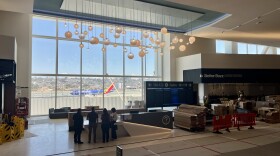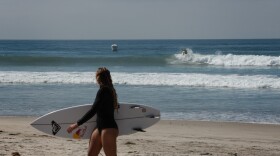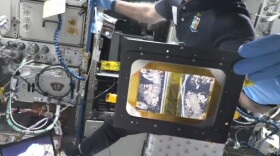On Saturday, Project [BLANK] will present a single performance of "Park Opera," which redefines what opera can be. This large-scale, interdisciplinary arts installation uses the concept of opera as a jumping-off point to create a free public event that places art in unexpected places throughout Balboa Park.
What is Project [BLANK]?
To appreciate what "Park Opera" is all about it helps to understand the mission of Project [BLANK], beginning with its clever and playful name.
"It's a fill in the blank," said Leslie Leytham, the company's artistic director. "Because each concert isn't like the next. It's a pretty varied offering. So we do performance art, we do installation work, sound as installation, which is what 'Park Opera' is. We do contemporary classical music, notated music. We've done retellings of of older scores. For example, we did a version of Oliver Messiaen's 'Quartet for the End of Time,' but told through the lens of an alien abduction ... because why not?"
It's that "why not?" attitude that is so exciting. The [BLANK] space is meant as an inspiring reminder that art is at its best when it challenges expectations and is not forced to fit neatly in a box. It should explode boundaries.
And that is precisely what Project [BLANK] is doing with "Park Opera."

What is 'Park Opera'?
"'Park Opera' is a modular opera installation, where you take the component parts of an opera and then scatter them around a public park," Leytham said. "So people can take it at their own pace. They can go through it as fast or slow as they want, take in as little or as much of it as they want. We'll give them a map when they arrive at our lobby, which will be the Moreton Fig Tree. We've got a path that we've designated for them, but people can take it at their pleasure."
![The map laying out where you can find each act of the Project [BLANK] "Park Opera" on Saturday.](https://cdn.kpbs.org/dims4/default/b3bd3cb/2147483647/strip/true/crop/5100x3300+0+0/resize/880x569!/quality/90/?url=http%3A%2F%2Fkpbs-brightspot.s3.us-west-2.amazonaws.com%2Fdc%2F23%2Ff38b011143d0a2ec4df4a945d995%2F5-4-map-final-park-opera.png)
The opera begins at 4 p.m. in the foyer of the Moreton Fig Tree and then serves up 10 acts throughout the park that include a Mermaid Aria, Binoculars for Sound and The Chorus of Bluebirds. Composer Wojtek Blecharz has performed "Park Opera" multiple times, adapting it to each environment.
"’Park Opera’ is made of 10 acts, and they can be arranged in different order depending on the space," Blecharz explained. "So far, ‘Park Opera’ was done in a park in Warsaw, in a forest in Switzerland, on a small island in the middle of a lake in Austria, and now it's here. So every time the sound work had to be adapted. This is the San Diego version of 'Park Opera,' and this sound is especially adapted for Balboa Park. Balboa Park is the libretto for the opera. So we were walking and listening and trying to compose this sound walk in the best way, in the best experience."
You can experience the opera exactly as designed, rearrange it or just happen upon it accidentally while visiting the park, which is something that excites Leytham.
"It's not that often we get an opportunity to encounter live music, live installation work," Leytham said. "It's often relegated to the kingdom of the opera house or gallery. They are stories that might feel exclusive or that might not feel like you can relate to the work that's being presented. Sometimes it can feel off-putting, but by putting it in a public place, it makes the consumption of art or the interaction with art or engaging with art very egalitarian, and that it is for everyone. Anybody can get something from this. It's not exclusive. It's for everyone. And so if they happen upon it, that's great. Then they can choose to come on the journey or not, and then they have that little memory to take with them."
But you need to be prepared to actively listen.
![Leslie Leytham, artistic director at Project [BLANK], sings a bee aria in "Park Opera" on Saturday in Balboa Park. April 18, 2025](https://cdn.kpbs.org/dims4/default/6bffd5a/2147483647/strip/true/crop/1754x1080+71+0/resize/880x542!/quality/90/?url=http%3A%2F%2Fkpbs-brightspot.s3.us-west-2.amazonaws.com%2F26%2F40%2F31e671b84a4eb5ebb0da02045172%2Fleslie-leytham.jpg)
Leytham is also a mezzo-soprano who will be performing a unique aria.
"In this aria, each of the instrumental musical components include some natural world device to them. In this case, the diva, the opera singer, is a bee — a little pollinating bumble bee," Leytham said.
She is that pollinating bee singing notes and making sounds that evoke a busy hive.
"We're always trying to find new ways to bring in what I think are the super interesting voices, not only from San Diego, but from around the world," Leytham added. "And there's some beautiful work being done that explores the relationship between sound and body and the natural world, and particularly by this composer, Wojtek Blecharz."

Some of Blecharz's compositions ask musicians to use their instruments in unconventional ways and to make sounds so quiet that the audience really has to make an effort to hear it.
"'Park Opera' is an opera about listening, and it's an opera about there's no protagonist, there's no storyline," Leytham said. "It's about putting an opera in a space that is unobtrusive, where you might just miss it if you're walking past. All of the sounds that the musicians are playing are really small, and this gestural language that invites the listener to get closer. It invites the listener to listen in a more embodied way and a less prescriptive way than where there's rules of engagement — you sit in your seat, you behave yourself, you're quiet, you applaud when allowed while the symphony or the opera is being performed in front of you. And in this case, you become part of the opera listening. Wojtek likes to say that listening is the protagonist in this opera, and all of the people coming and experience it become a part of it. It just felt like such a nice a beautiful way to celebrate not only this public space that I love, that is this haven of beauty and history but a way to activate it and get people to experience and engage all of their senses in a different way."
The opera will take place throughout different spaces in the park. It will activate the Desert Cactus Garden, where you can find their idea of a grand piano; the fountain in front of the Reuben H. Fleet Center, where you can listen to the white noise of the water or make use of sound binoculars; and the Zoro Garden, where you can hear a chorus of bluebirds.
"So it's all about finding ways to relate to the natural environment that is hidden in plain sight in the middle of an urban landscape that you can get lost in a desert grove not realizing there's a freeway right there," Leytham said. "It's beautiful, transformative and the park itself is a transformative place. And then the opera then just heightens that. It helps you to disappear in this fantasy land."
![Composer Wojtek Blecharz and Project [BLANK] artistic director Leslie Leytham at the Rose Garden in Balboa Park, which will be the site of one of the acts of "Park Opera" on Saturday. May 1, 2025](https://cdn.kpbs.org/dims4/default/f469343/2147483647/strip/true/crop/1754x1080+147+0/resize/880x542!/quality/90/?url=http%3A%2F%2Fkpbs-brightspot.s3.us-west-2.amazonaws.com%2F96%2F0c%2F46026e0b4b1992583f8837202470%2Fwojtek-and-leytham.jpg)
So don’t be surprised if you come across unicorns by the Rose Garden.
"In 'Park Opera,' we invited the unicorns to also perform with us," Blecharz said. "And they actually like to eat the rose petals. So they live in the nearby bushes. And when you come to the show, you won't be able to see them because humankind lost the ability to see these mythic creatures, but we will be able to feel the presence of the unicorns. But you have to come and see."
The fountain may provide the most interactive location for the opera.
"It is the most beautiful source of white noise in the entire park," Leytham noted. "And at this part of the opera, we will have the binocular station. So in an opera house, you use your spectacles to see the stage. But in this case, we're going to use them to hear bigger and to amplify the natural world with very analog tools like glass bottles and jars and vases and beakers that work like a conch shell."
Blecharz elaborated: "It's all about composing your own listening experience. And by filtering a white noise and filtering using different materials next to your ears, you can hear different sounds. Our opera is also about pure silence or only natural sounds. They are almost nonexistent; we have to coexist with the manmade sounds, and they are always present in the surroundings. So, yeah, this is where we are in this moment of our lives, and we always have to deal with this sound pollution — or however we name this sound."
Project [BLANK] put in a lot of work to design and execute "Park Opera," from getting all the permits to collecting a group of talented artists willing to innovate. And the best way to experience the show is to leave all expectations behind.
"’Expect the unexpected’ is such a cliché," Leytham said. "But bring sunscreen, bring some headphones. There will be some sound walk components that you'll hear better if you have your own Airpods or noise canceling headphones, ideally. But yeah, come ready to engage in sound and performance in a way that you might never get a chance to see again."
“And most importantly, be all ears," Blecharz advised.
"Park Opera" takes place Saturday in Balboa Park from 4 to 7 p.m., with the Moreton Fig Tree serving as the lobby or starting point of the show. Although you can come at any time and join the show at any point, it is recommended to arrive no later than 6 p.m. if you want to see everything.





